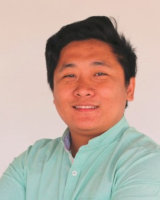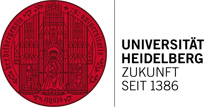“Germany is undoubtedly the ‘Land of Ideas’"

Dr Rhondemo Kikon, Medical Doctor and Public Health Specialist at Heidelberg Institute of Global Health at Heidelberg University
Master of Science in International Health at the Heidelberg Institute of Global Health (HIGH) of the Medical Faculty and the Heidelberg University Hospital from 2016 to 2017, project stay at the HIGH within the framework of the German Chancellor Fellowship for prospective leaders of the Alexander von Humboldt Foundation for one year since October 2021.
When, how long and in what position did you stay at Heidelberg University?
I had completed my Master of Science in International Health (MScIH) from the Heidelberg Institute of Global Health (HIGH) in 2017. In October 2021, I had returned to Heidelberg after being selected for the German Chancellor Fellowship awarded by the Alexander von Humboldt Foundation. As a part of the fellowship, I am pursuing a research project on "Childhood Obesity: An Exploration of School-based Health Promotion Preventative Interventions" at HIGH under the supervision of Dr Andreas Deckert.
Why did you decide in favour of Heidelberg University?
The Master of Science in International Health at HIGH offered the modules and short courses that perfectly suited my professional goals and dreams. For example, the course enhanced my research skills and tools on how to strengthen health systems in low and middle-income countries.
What did you like best about being in Heidelberg? What suggestions would you have for improvements?
At the university, I connected with friends from different countries around the globe. I experienced firsthand the university's rich cultural diversity both inside and outside the classroom. In addition, I also met my mentor Prof. Dr Andreas Ruppel, who guided my career and shaped my personality. In addition, the friendly international student environment and the warm-heartedness of the German people made Heidelberg feel just like home.
How did your career continue after your time in Heidelberg?
I went back to India and led the Community Health Initiative (CHI), an NGO I founded in Nagaland, India. CHI focuses on improving the health and social challenges of disadvantaged populations living in the mountains. In November 2019, I had co-organized an international workshop on "Health perspectives for marginalized populations" in Nagaland, India. I organized the event in collaboration with CHI, HIGH and the Kailash Satyarthi Childrens Foundation (Founded by Mr. Kailash Satyarthi, Nobel Peace Prize Laureate in 2014). Through this workshop, we had developed an action plan on "Child-Friendly Village" to improve children's health in rural areas of the region.
In addition, from September 2020 to September 2021, I worked as a Health Consultant for the Indian Council for Medical Research (ICMR), Government of India, under the National Clinical Registry for the COVID-19 Project. The objective of the registry was to collect real-time data to inform evidence-based clinical practice, research, and to formulate guidelines and policymaking. All of this was in line with the training in International Health of the Master Program in Heidelberg.
What is your view of the German scientific system in comparison to that of your home country or to that of other countries where you may have conducted research?
In my opinion, Germany is undoubtedly the “Land of Ideas” as well known to many researchers worldwide. I thoroughly enjoyed my scientific and personal interactions with my lecturers and professors in Germany, as there was no form of hierarchy as generally experienced in my home. In addition, the research ecosystem is superb; for example, when I was looking for participants for my thesis study, I was very welcomed and supported by most institutions, including civil society.
In your opinion, what is the importance of international exchanges for researchers?
In the globalized world we live in today, many of our challenges are very much interconnected and transcend beyond borders: Climate Change, COVID-19 pandemic, health and social disparities. Therefore, there is great importance for the international exchange of researchers to identify the knowledge gaps and provide evidence-based solutions to today's global challenges.
Do you recommend a research visit to Heidelberg University to your students or to colleagues in your scientific network?
Absolutely! I was a DAAD Young Ambassador in India for the last two years and promoted Germany's study and research opportunities. During this period, I highly encouraged many students and researchers to apply at Heidelberg University for its excellent academic environment and great prospects.

